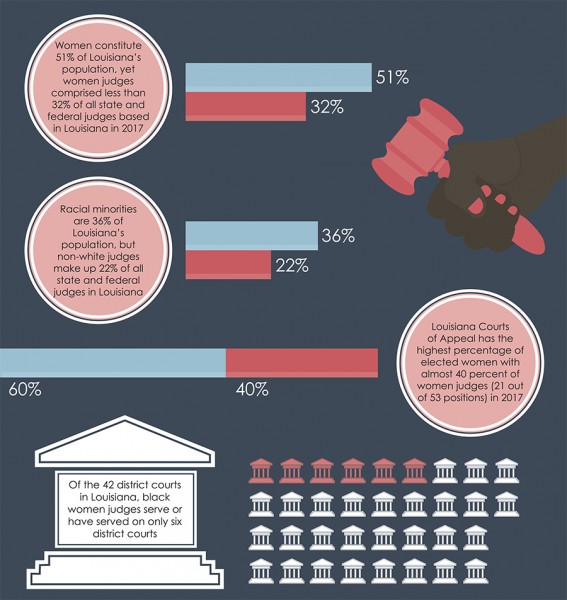Louisiana must address lack of judicial diversity in the state

Emma Vaughters | Layout Associate

A recent study conducted by two Tulane professors, released Jan. 25, underscored a startling lack of diversity in Louisiana’s judiciary. Professors Sally J. Kenney and Heather L. Johnson, reviewing available Louisiana Secretary of State data, found that despite a 100 percent increase in the number of district court judges, female and minority representation increased by only one percent in the last 25 years. These statistics, among others, point to an indisputable need for more equitable representation in Louisiana’s court system.
The report provided a comprehensive account of the Louisiana judiciary’s demographic composition. In Louisiana, non-white minorities are 36 percent of the state’s population, yet they comprise only 22 percent of state and federal judges. Currently, the Louisiana Supreme Court is comprised of six white men and a single black woman. Women account for less than 32 percent of Louisiana’s state and federal judges. Throughout Louisiana’s 42 district courts, African-Americans serve or have served on 19 of these, with black women serving on only six. These numbers, seemingly abstract, indicate worrying under-representation.
These numbers are troublesome. In Louisiana, the world’s prison capital, African-Americans make up 66 percent of the incarcerated population, yet the inequities of the state’s judicial system inhibit a trial by their peers. Unsurprisingly, sentencing disparities reflect representational disparities: black men receive longer sentences than their white counterparts.
For women, a predominately white, male judiciary has often discounted female experiences, particularly regarding sexual assault. Without equality on the bench, there can seldom be equality in sentencing.
These numbers may be particularly notable in Louisiana, but they follow a nationwide tendency of under-representing minorities in state and federal courts. According to the Center for American Progress, in 2016 only 20 percent of state judges across the U.S. were racial minorities. Likewise, less than a third of state judges were women. Under the current administration, this trend has only intensified: six white men have been named to Louisiana’s federal courts, with only one white woman and one Asian man.
The benefits of a diverse, representative judiciary extend beyond the courtroom. Judges from the state courthouse to the Supreme Court bring their personal experiences to each case. Interacting with their peers, judges impart valuable perspectives to each other. This exchange of ideas generates a justice system sensitive to the needs of all.
Tulane women and students of color should be concerned about the possibility that they are attending school in a state whose judicial system does not reflect them, and may not be adequately able to represent their interests and experiences should they ever need to participate in legal processes. The lack of diversity in the state’s judiciary should also pose a problem for Tulane’s 700 law school students, and for the hundreds of undergraduate students who hope to pursue careers in the field.
Some may argue that both women and minorities are not prevented from holding judgeships. This is true. Nonetheless, the facts undeniably illustrate that, despite talk of justice being blind, the reality is anything but. Instead of accepting these disparities, we must take active, intentional steps to foster a court system not simply for the people, but genuinely of the people.
This is an opinion article and does not reflect the views of The Tulane Hullabaloo. Nketiah is a sophomore at Newcomb-Tulane College. He can be reached at [email protected].
Your donation will support the student journalists of Tulane University. Your contribution will allow us to purchase equipment and cover our annual website hosting costs.
















Leave a Comment